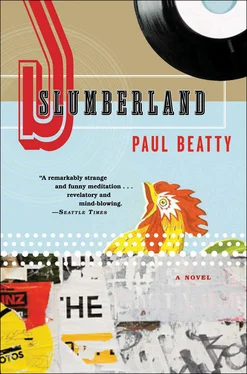The tune, like most contrivances of the black telegentsia, seemed lost, a corny cacophonic search among the ruins of a romanticized African history for a self-affirming excuse to love being black. However, Wynton’s pretentious narcissistic nigrescence couldn’t fool me.* The pentatonic scaling and the repetition of the ninth through twelfth bars belied an underlying skittishness, and the song flitted aimlessly about like a flock of canaries that have flown into a room and can’t find their way out. If I had had a sack of breadcrumbs and sprinkled them on the car floor, his cawing notes would’ve fluttered from his trumpet one by one, landed at my feet, and begged for attention. The thunderclap of an Art Blakey rim shot would’ve scattered the song into nothingness, leaving nothing but muted airs and some unresolved psychosexual issues with Mother Africa.
I hate Wynton Marsalis in the same manner Rommel hated Hitler. Whenever I hear Marsalis’s trumpet playing I feel like the Desert Fox forced to come to grips with the consequences of totalitarianism after the war has been all but lost. At least Rommel had Wagner. All I’ve got is Wynton. His musical Valkyries arrive not on winged steeds but astride caged birds.
Wynton Marsalis reminds me that I was born wearing the wrong uniform. That I’m a Negro-Nazi who, being only a DJ and not a general, politician, or movie director, is at best a functionary or house-party gauleiter. At the tribunal I will not claim that during the culture wars I was deceived by my superiors and had no knowledge of the camps. I will plead guilty to the charge of crimes against humanity. Admit that I was a deceiver. A trickster whose greatest transgressions were kick-starting the strip-club putsch of 1989 by giving voice to the earliest in Afro-fascist rap (Young MC, JJ Fad, and DJ Jazzy Jeff and the Fresh Prince) and knowing of the existence of the death camps: the University of California at Berkeley, the Nuyorican Poets Cafe, the Lyricist Lounge, Naropa, Def Jam and Bad Boy Records, the Abyssinian Baptist Church, and that Auschwitz of free thought, Jazz at Lincoln Center.
The song labored on, Wynton’s band, like the critics, playing in the past tense. I began to feel a wave of black conformity wash over me and I felt the need to remind myself that oppression didn’t start with Kunta Kinte and that the trains probably ran on time before Hitler. A yawn that I didn’t bother to stifle left my lips.
Modern jazz, like the modern man, was devoid of funk, devoid of mystery. Maybe what Wynton’s band needed was a maladjusted white cat, a Bix, Benny Goodman, Gerry Mulligan, Adam Yauch, or an F. Scott Fitzgerald to give it some fervor. That way they could stop playing with a sense of entitlement and start playing with the daring birthed by vicariousness — but these days there’s never a Gene Krupa around when you need one.
The existentialists say the flap of a butterfly’s wings in the jungles of Mauritania can cause a hurricane in the plains of Kansas, but a high C from Wynton Marsalis’s trumpet doesn’t even change your mood, much less your mind. And I don’t know whether or not Marsalis’s music is an allegory for race, American democracy, or black fascism, but I do know the Schwa’s music is anarchy. It’s Somalia. It’s the Department of Motor Vehicles. It’s Albert Einstein’s hair.
When we arrived back at my place I took out the chicken-fucking song and wiggled it in Doris’s face, indicating that I wanted to play it. Doris shook her head. That was our song. Our little free-jazz secret. I popped it into the VCR anyway. Lars was perusing the stacks of books that rose from the floor of my dingy apartment like paperback stalagmites. He opened a tattered Nabokov. Appropriate because the Schwa plays like Nabokov writes. I’m convinced that Nabokov wrote his novels around words like agglutinate, siliceous, gardyloo, ophidian, triskelions . That he took an ESL course at a local night school and the teacher wrote those words on the blackboard and said, “Today’s assignment is to take these words and use them in a first novel the New York Times will call ‘Riveting, truly a classic for the ages.’ ” Surely the Schwa’s process is similar, because every ten measures or so there’s a snippet, a riff within a riff that makes you realize that the previous nine measures were just an excuse to play a tricolor chord that bursts open in the middle of the song like a firework exploding in a clear night sky.
Lars sat on the arm of the couch grinning at Nabokov’s prosody. He was as relaxed as a boxer who thinks he’s far enough ahead on the card in the fight for cultural hegemony to let his hipster guard down and coast to an easy victory. He wasn’t paying that overhand left whistling in the distance any mind, and when the Schwa’s avant-garde jazz trochaics hit him, the smile on his face changed from mirthful to the be-mused toothy grin of a boxer who’s been seriously hurt by a punch but doesn’t want his opponent to know he can hear his own brains sloshing inside his skull. The genuflecting glaze in his eyes gave him away. Lars knew straightaway who it was. He considered himself Europe’s foremost authority on Charles Stone, and here his best friend was playing a heretofore unknown Stone gem, and he was hurt. Throw-in-the-towel hurt.
I wouldn’t turn off the music. The Nabokov fell face open into his lap. It might have been from muscle fatigue, though I suspect it was to hide an erection. The stud on the screen continued to pound the chicken doggy style, if that’s at all possible. The music continued on as if the Schwa were in the room using the book as sheet music. . shadography, Lacedaemonian sensation, ocelate . . Lars began to cry. Hearing that unknown recording of the Schwa affected him the same as if I’d told him Steve Biko, Bud Powell, Janis Joplin, Patrick Lumumba, and Bob Marley had survived the Rolling Stone rhetoric and were running glass-bottomed boat excursions off the Florida Keys. He buried his head into a sofa cushion, not in shame but to muffle his sobbing so that it didn’t interfere with the music. When the song ended he fired the Nabokov at my head.
“How can you live with yourself?” he yelled. “You verdammte DJs with your secrecy, your white labels and hush-hush-close-the-door-we’re-the-only-ones-with-cocaine-and-a-Japanese-import-on-vinyl-cooler-than-thou attitude. You know I worship this guy. How dare you sit on the greatest jazz piece recorded since 1969, unveiling it only to select guests like it’s a stolen fucking Picasso. You people think that because you own the recording you own the music.”
“You people?” I asked, slipping behind my turntables.
“ Entschuldigen Sie . DJs aren’t people, they’re parasites.”
Lars picked up a Zora Neale Hurston and a Eugene O’Neill and fired a double-barreled scattershot blast at Doris.
“And fuck you too! Keeping this from me! You guys are probably fucking behind my back too!”
I switched on the sampler and calmly dropped the needle on the record. The first booming thump of my almost-perfect beat caved in Lars’s chest. When the hook kicked in it was as if Doctor Funkenstein had tapped his spinal cord with a rubber hammer. The autonomic reflexes took over. The crispy highs caused his neck to snap and jerk back and forth. The pounding lows dropped his ass halfway to the floor, rolled his shoulders, and turned his pelvis into a gyroscope of grinding sensuality. Meanwhile his pronated hands hovered mummylike in front of his chest and surfed the midrange. I finished my groove and Lars bit down hard on his bottom lip. I knew what he wanted to say. He wanted to say, “Damn, nigger, so that’s what it feels like to be black.”
Instead he opened the windows, letting the very last of the cool daylight air blow into the room like a runaway child come home. “Now I know why you came to Germany,” he said. “You want to get Stone to lay down an original groove over your track.”
Читать дальше












